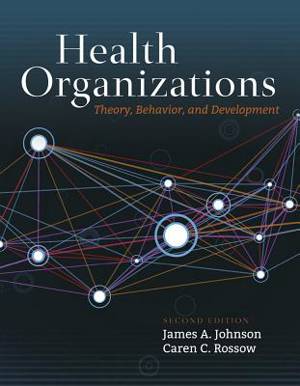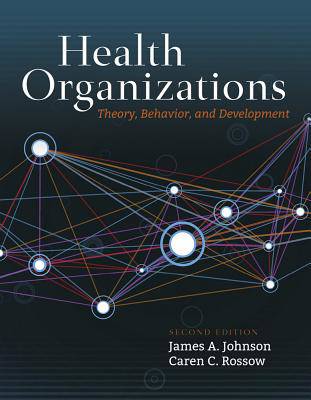
- Retrait gratuit dans votre magasin Club
- 7.000.000 titres dans notre catalogue
- Payer en toute sécurité
- Toujours un magasin près de chez vous
- Retrait gratuit dans votre magasin Club
- 7.000.0000 titres dans notre catalogue
- Payer en toute sécurité
- Toujours un magasin près de chez vous
Health Organizations
Theory, Behavior, and Development
James a Johnson, Caren C Rossow
Livre broché | Anglais
108,95 €
+ 217 points
Description
Organizations are complex human systems that have evolved over time and continue to do so in an increasingly globalized, information enriched, technology intensive era such as the 21st century. This is especially so following the Affordable Care Act legislation and regulations in the U.S. The new Second Edition of Health Organizations: Theory, Behavior, and Development addresses these changes by integrating new content throughout every chapter and topic area.Health organizations are comprised of highly credentialed professionals who function under considerable scrutiny within many prescribed guidelines. The challenge of managing in this environment is great with the basis of any level of effectiveness coming from an understanding of individual, group, and organization behavior. Additionally, health organizations are not static, tasking leaders to facilitate and manage the change that is inevitable in modern organizations. This book will help the student and practitioner put to use theories of organization and knowledge of organization behavior in ways that foster change in productive and sustainable ways resulting in better outcomes. Students will learn systematic planned approaches for organization development and team building and by examining power, influence, conflict, motivation, and leadership in the context of health service delivery.The overall framework of the Second Edition remains the same as the first book with the following three sections: - Part I - Organization Theory Past and Present- Part II - Organization Dynamics and Human Behavior- Part III - Organization Development and SustainabilityThe Second Edition introduces new elements including: chapter overviews; film learning exercises; key terms; case studies; chapter discussion questions; in-class exercises; online learning activities; key interviews with leaders and managers; appendix; study guide; and other supporting ancillaries.
Spécifications
Parties prenantes
- Auteur(s) :
- Editeur:
Contenu
- Nombre de pages :
- 292
- Langue:
- Anglais
Caractéristiques
- EAN:
- 9781284109825
- Date de parution :
- 01-09-17
- Format:
- Livre broché
- Format numérique:
- Trade paperback (VS)
- Dimensions :
- 178 mm x 226 mm
- Poids :
- 430 g

Les avis
Nous publions uniquement les avis qui respectent les conditions requises. Consultez nos conditions pour les avis.






